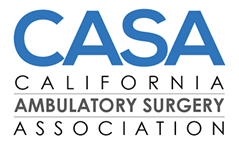|
On October 1,2025, Governor Newsom signed AB 876 (Flora) Nurse anesthetists: scope of practice into law. AB 876 delivers clarity to existing statutes and reaffirms the essential role of CRNAs in California’s health care system. The bill does not expand CRNA scope, but rather codifies current, safe, and effective practices to prevent future misunderstandings.
CASA is on record as supportive of this legislation as it provides needed guidance to our members. It aligns with current standards of care, enabling ambulatory surgery centers to confidently credential, privilege, and conduct peer reviews in a manner consistent with state law and best practices.
CASA is committed to ensuring all Californians have access to safe, timely, and high-quality surgical care. However, the ongoing shortage of anesthesia providers across our state is straining surgical services and limiting access to care—particularly in rural and underserved communities. We thank Governor Newsom for signing this legislation giving our members clear guidance and tools to continue to serve and provide care to their communities.
What AB 876 does:
- Expressly authorizes CRNAs to perform “anesthesia services.” The term is defined to include pre-, intra-, and postoperative care, pain management, and emergency/critical care/resuscitation functions.
- An order from a physician, dentist, or podiatrist for anesthesia services for a specific patient is the authorization for the CRNA to select and implement the anesthesia modality and to modify/abort it during care. (In other words, the order itself empowers the CRNA to manage the anesthetic.)
- A CRNA’s selection and administration of medications (including controlled substances) under that order is not a “prescription” under federal drug-order definitions—so a separate prescription is not required for the intra-/peri-operative medications the CRNA administers.
The bill states it is declaratory of existing law (citing California Society of Anesthesiologists v. Brown, 2012), i.e., it’s clarifying and codifying current practice rather than creating new liability exposure.
On September 6, 2024, the California Department of Public Health (CDPH) released an All Facilities Letter (AFL) addressing the requirements for Certified Registered Nurse Anesthetists (CRNAs) in General Acute Care Hospitals. Although this AFL is directed at hospitals, it contains valuable information and references that will also benefit California ASCs that utilize CRNAs in their daily operations.
In response to the recent CDPH guidance, key reminders from the AFL and AB 876 include the following:
-
ASCs should ensure that their governing practices grant clinical privileges to all providers, confirming they are professionally qualified and appropriately credentialed according to the center’s bylaws.
-
For procedures requiring anesthesia, physician orders should authorize “anesthesia and its related medications by a qualified anesthesia provider as determined by the facility.” The best practice is to implement this policy regardless of the type of anesthesia provider.
-
A CRNA must be responsible for their own professional conduct and may be held liable for those professional acts.
-
In California, a CRNA administering anesthesia services is not required to be under the supervision of the operating practitioner or of an anesthesiologist; however, they may only provide services within their scope of practice. “It is the Nursing Practice Act that gives CRNAs legal authority to administer anesthesia after a physician orders a course of treatment that includes anesthesia." (California Soc'y of Anesthesiologists v. Superior Court; see also BPC section 2725)
-
ASCs should maintain written policies and procedures regarding anesthesia, aligned with their bylaws and approved by their governing body.

|


